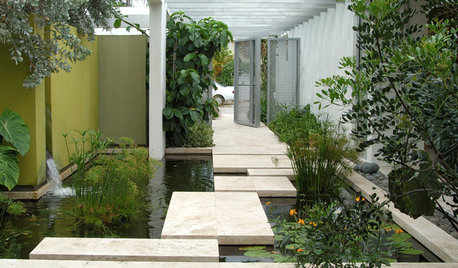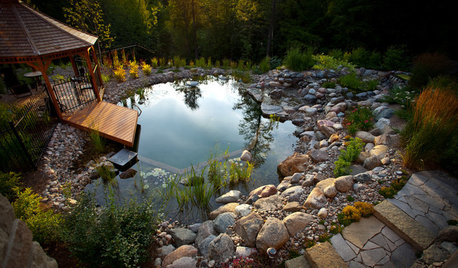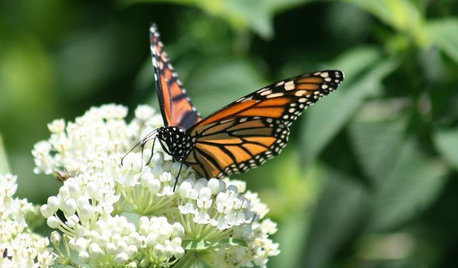Mosquito control
I just finished reading a very long thread from someone who was wanting to avoid using DEET to keep the mosquitoes off. Many of the suggestions were folk remedies that are either totally ineffective or mostly ineffective. Others are well documented, proven, alternatives to DEET. Since I am a freelance writer and currently working on an article on organic mosquito control, I decided to share some of my research and personal experience here and hopefully provide a comprehensive, effective, organic approach to mosquito control.
Before we start: I want to note that DEET is by far the LONGEST LASTING effective mosquito repellant. If you should choose to use it, remember, it is a chemical that is caustic to plastics and other synthetic materials. It should be used with extreme caution. Also, the concentration of DEET in a product determines the length of time it will be effective before you must reapply, it DOES NOT determine it's effectiveness (think about it, it's either effective or it's not. Mosquitoes either bite you or they don't). Roughly 25% is pretty much universally regarded as an amount that will protect for up to 5 hours.
For more information on DEET, please visit:
http://www.scorecard.org/chemical-profiles/summary.tcl?edf_substance_id=134-62-3
I mention this only because the discussion of controlling mosquitoes is incomplete without mentioning DEET. DEET is relatively convenient, relatively safe at low concentrations, and, in my opinion, the best choice when needing to avoid mosquito bites in an uncontrollable environment such as camping, hiking, military service, or other outdoor activities where you cannot control the mosquito population in your surrounding area.
Moving on. There are 2 critical areas that must be addressed when it comes to effective mosquito control. First, is population control, and second is deterrent.
Population control is achieved by killing the adult insect and/or the insect larvae or otherwise interrupting their life cycle.
Deterrent is making the insects go elsewhere for their meal.
I'll address population control first.
When it comes to mosquito larvicide nothing, absolutely nothing, compares with Bacillus thuringiensis (Bt). Bt is a naturally occurring bacterial disease of insects. in some insecticides, these live dormant bacteria are the active ingredients. In others the delta-endtoxin the bacteria produce is the only active ingredient. Either way, the insect larvae must ingest the insecticide for it to be effective. There are several strains of Bt available for use against many different types of insects. Bacillus thuringiensis Israelensis (Bti) is the strain used against mosquitoes, but for the sake of thoroughness I'm including a complete list.
Kurstaki strain (Biobit, Dipel, MVP, Steward, Thuricide, etc.):
Vegetable insects
Cabbage worm (cabbage looper, imported cabbageworm, diamondback moth, etc.).
Tomato and tobacco hornworm.
Field and forage crop insects
European corn borer (granular formulations have given good control of first generation corn borers).
Alfalfa caterpillar, alfalfa webworm.
Fruit crop insects
Leafroller.
Achemon sphinx.
Tree and shrub insects
Tent caterpillar.
Fall webworm.
Leafroller.
Red-humped caterpillar.
Spiny elm caterpillar.
Western spruce budworm.
Pine budworm.
Pine butterfly.
Israelensis strains (Vectobac, Mosquito Dunks, Gnatrol, Bactimos, etc.)
Mosquito.
Black fly.
Fungus gnat.
San diego/tenebrionis strains (Trident, M-One, M-Trak, Foil, Novodor, etc.)
Colorado potato beetle.
Elm leaf beetle.
Cottonwood leaf beetle.
Bt is considered safe to people and non-target species, such as wildlife, and beneficial insects. Some formulations can be used on essentially all food crops (of course, you'd still want to thoroughly wash them before eating).
Of course, I can actually hear a few of you screaming "How is a biological insecticide organic!! It's germ warfare!" Well, that brings up the debate about what exactly organic means in this context. So, I'll just give you some facts and let you decide if it fits with your personal definition.
Bt is a naturally occurring bacterium common in soils throughout the world. Not all strains of Bt can infect insects. Even some strains that can infect insects are not lethal to the insect infected. What scientists have done is carefully isolate strains of the bacteria that are the most lethal to the specific species of insects they desire to control. These bacteria have not been genetically altered thorough genetic engineering, or other highly invasive technique. What has been done to develop these strains is much like the way dog breeds were developed. In a way, you can look at the useful Bt strains as being domesticated bacteria.
Still not convinced? Copepods (microscopic fresh-water crustaceans that feed on mosquito larvae) might be a better solution for you. Not nearly as easy to use as Bti, and not available commercially. If you want to use Copepods you'll have to breed them yourself. The following link will tell you how:
http://fmel.ifas.ufl.edu/culture.htm
Now, those of you who aren't afraid of the mosquito-killing Dobermans of the bacterial world probably want to know, "where do I get Bti? and how do I apply it?"
Great, glad you asked. There are 2 types of Bti suspensions; liquid and dry. Each has its application, and your outdoor space will determine which you'll want to use. I can only tell you the application process I use that seems to have gotten me pretty good results, especially since my property is only 1/4 acre, in the heart of the city, and bordering a flood/storm drain stream area.
For standing water that I like to have around, like my container water garden, birdbath, fountain, etc. I use a liquid suspension. My particular brand is called Microbe-Lift BMC. Once a week I visit all my water features and apply a few drops. It's easy, effective, and doesn't disturb the larvae of insects that I want to have around. Like Dragonfly larvae.
I use dunks in my roof gutters, the water catchers under my potted plants, low spots in my yard where water collects, and anywhere else I find that I have standing water after it rains or I water my plants. These are places that it is either inconvenient to empty out the standing water, or simply impossible.
The real key is to use the right size dunk for the application. For instance, in my roof gutters I use a couple large dunks that can be wedged in there so they don't impede water flow, but still don't wash away. Thus I only have to do it when I give the gutters a good spring cleaning. I also have a hollow tree that tends to collect water, but is very hard to get to the large trunk opening 15 feet off the ground. A small colony of bats lives in this tree, and I would hate to disturb them. Thus, so I don't have to climb the tree very often, I use a large dunk that will last the whole mosquito season.
Also in the dry suspension category is a product called mosquito bits. Like dunks but granule size. About once a month I apply 72 oz of this stuff to my entire property with my broadcast spreader. I also sprinkle about 16 oz of it in my wood pile.
Notice earlier I mentioned places that collect standing water that are inconvenient or impossible to empty. Containers that can be emptied, or even better, kept from filling with water in the first place, should be. This is very important because like most of us, mosquitoes are lazy and want an environment where all their wants and needs are within easy reach. If you make the area around your house as inhospitable to them as possible, they will live elsewhere. Believe me, this works, even for a guy like me that lives next to a drainage ditch.
take a walk around your property, paying special attention to places that would hold water. Here are a few things you might look for:
Clogged roof gutters (absolute #1 mosquito dream home!)
Deadwood
Children's toys and bicycles
Old tires
Trash cans
Wheelbarrow
Unused pots
Grill
Basement window wells
Area under your deck or shed.
Compost heap
Forked branches of a large tree
Tarps
Cans or bottles
That should be a start, but I'm sure you'll find other places you wouldn't have ever thought of if you hadn't gone out specifically looking for these secret mosquito love nests. Once you've identified them, empty them, treat them with Bti, or find a way to prevent them from gathering water. Drill holes in the bottom of open top trashcans. Always store your wheelbarrow upside down. Make sure the kids pick up their toys out of the yard. Install gutter guards to keep them from clogging.
Sounds like a lot of work? it really isn't. I guarantee you I spend more time weeding, harvesting, rotating my compost heap, planting, pruning, mowing, and all the other chores of a loving gardener. Believe me, a small investment of time in eliminating mosquito habitat from your home will be well worth it. Remember, for every puddle, pool, or mini-pond you have on your property that you don't do anything about, your going to have hundreds of little blood suckers who don't have to go very far for their first meal.
Killing adult mosquitoes is much harder. That's why I spent all that time talking about Bti. Still, some of them will make it to adulthood, so some plan of action should be in place to make sure that maturity is no picnic either.
So, how to do it? Well, please stay away from the bug zapper type lures. First, they don't attract mosquitoes very well since mosquitoes aren't strongly attracted to ultraviolet light. But the new mosquito magnets really really work. I mean, really really work.
Granted, Mosquito magnets are, to say the least, about as attractive as a gas grill. They use propane, which is probably not considered organic except by certain types of chemists. But they work, are non-polluting, and harmless to everyone and everything that is not a mosquito.
A friend of mine brought his to our Fourth of July celebration last year. It was set-up in the back of his pick-up. Now, I am mosquito candy, even wearing DEET I will get bit at least once. I've even been bit through denim jeans. But, I decided to forgo the DEET this time around and prepared myself for the misery that was sure to come. We started the thing several hours before dusk, ate, played, then settled down on a picnic blanket in the grass about 20 feet from the truck to watch the fireworks display. When it was over, guess how many bites I had?
None.
I asked around, and almost everyone else nearby hadn't been bitten either. The only people I could find that had been bitten were a father and son duo who admitted that they had been down by the lake fishing earlier.
All I can say is wow. They are expensive. But after going over to my friend's house several more times this summer, and not getting bit once while I was out there. Even when we all went swimming in his natural pool at around dusk. I am convinced and I'm buying one.
Still, considering the cheapest mosquito magnets right now run $200 to $300 dollars, we should explore a more economical ways of eliminating these micro-vampires with wings.
Of course, Lestat never had to worry about anyone 500 times his size eating him. (well, not until toward the end of the series anyway)
While birds and bats are often the most touted mosquito hunters, it's actually not quite true. purple martins, swallows (most swallows, I'll get to that in a minute), sparrows, starlings and other insectivore birds have a hard time catching insects as small as mosquitoes. Also, mosquitoes are a pretty small meal, and they don't swarm. Look at it this way, would you bother growing and eating corn if each stalk only produced 1 or 2 kernels? But the biggest problem with attracting birds to your house is that birds are one of most mosquitos' favorite foods. Add to this the fact that West Nile virus needs birds as a primary carrier has actually gotten me to think seriously about taking the gourds out of my trees. (oh, come now, don't tell me you've never made a bird house from a gourd before?)
Bats have the same problem, although to a lesser extent. North American bats, for the most part, eat more mosquitoes than all but one bird species on the same continent (the tree swallow, Tachycineta bicolor, a difficult bird to keep around since house swallows and starlings are very aggressive toward them. If you want to attract them, try planting some bayberry). But when compared to the amount of other insects bats eat, bats don't really put much of a dent in the mosquito population due to the same reasons birds don't; mosquitoes are small, and don't swarm. Bats though, unlike most insectivore birds, are better equipped to hunt in the low light conditions during which mosquitoes are most active.
Side note: Bats are great at controlling other insect populations though. Even a small bat house nearby will greatly reduce your number of June bugs, moths, stinkbugs, boxelders, and the like. Plus, unlike birds, bats don't usually feed on dragonflies since dragonflies stay so low to the ground. plus, the big bonus for a gardener; guano. For a great site on bats and bat houses check out this link:
So if birds and bats aren't the mosquito hunters they are touted to be, then what?
Toads and frogs.
Both eat hundreds and hundreds of adult mosquitoes every day. Both enjoy the same sort of wet environments that mosquitoes enjoy, and tadpoles eat mosquito larvae. In fact, the only real problem with toads and frogs is that they also eat dragonflies. If you already have a pond or stream (natural or artificial) then you probably already have quite a few toads and frogs. If you haven't seen any, you can import some. Just find a nearby ditch or pond in late spring and capture some tadpoles. You'll want to also bring enough water from their original environment so you don't have to add chlorinated water while the tadpoles develop. My personal technique is one from childhood. Take a bucket and a plastic cup down to the stream edge. Then, stir the water along the edges slightly so that the tadpoles try to swim away. Scoop them up; water and all, with your cup and then gentle pour them into the bucket. Keep scooping water and tadpoles until the bucket is full. If you're lucky, you'll get dragonfly larvae too. Once the tadpoles mature, keeping them around is as easy as providing plenty of things to hide under during the day, and a plentiful water supply that is accessible to them. For my yard, I dug some small holes in the dirt and then placed landscaping rock over the shallow holes. As for the water, my shallow cattail garden must be pretty comfortable, because I have plenty of these guys around. Just watch out when you're mowing the lawn.
Finally, did I mention dragonflies? They are near the ultimate mosquito killer. An adult dragonfly will eat twice the number of mosquitoes that a frog or toad will. Problem is, while they are truly mosquito hunting machines, they require the exact same habitat that mosquitoes thrive in. Since mosquitoes are a major part of the dragonfly's diet from the day the dragonflies hatch from their eggs to the day they die, even if you could develop a large enough dragonfly population to make a significant dent in your mosquito population, once the mosquitoes are gone, the dragonflies will move on.
Which brings us to Deterrent.
Our heroic efforts have gone to naught! We are beset on all sides by buzzing wings that call out for blood! Oh cruel fate that we should be thus plagued for no greater sin than sweating and breathing outward!
Fear not.
We have been granted mint, basil, sage, and greatest of all our protectors; catnip.
all kidding aside, catnip has been proven in lab studies to be just as effective as DEET but not nearly as long lasting. If that's not enough, it's pretty (well, to me anyway) and there are quite a few other plants in the Nepeta family that have shown promise as mosquito deterrents. I have quite a bit of Ground Ivy (N. hederacea) along paths and around landscaping rocks and it is beautiful stuff. I've planted stands of catnip (N. Cataria) mauve catmint (N. Faassenii) basil red rubin (O. basilicum 'Purpurascens') and may night sage ( S. nemerosas) all around the place. Using the foliage of these plants to add interest to the ever-changing collection of annuals that surround them.
While planting Nepetas, Salvias, and Ocimums will add attractive, somewhat utilitarian, plants to your ornamental landscaping. Planting them in and of themselves will not deter mosquitoes from looking around your garden for a nice meal. It is the essential plant oils that provide the repellant effect. Which means that the plant must be crushed for it to be useful as a repellant.
This is one of the reasons I like Ground Ivy (also called, Gill-over-the-ground, N. Hederacea). As a ground cover, it is often trampled, and it actually holds up to light traffic, especially at it's edges. The other plants will require having the oil extracted and then applied to the skin frequently. The solution I've come up with is to crush the green plant leaves and stems with a garlic press and then boil them in a covered pot. It's important to cover the pot since, if you didn't, the essential oils of the plant would be carried away with the steam. I boil the "soup" for 5 to 10 minutes, and then bring it down to a simmer for 30 minutes. Afterwards, I let it cool down; pour it into an old gallon milk jug (actually, used to contain orange juice, If you use a milk jug that once had milk in it, you'll want to make sure it's washed out very well). I store the jug in the refrigerator, where it will keep for about a week, maybe two. When I want to use the concoction, I put it in one of those cheap mister bottles and carry the bottle with me. Before spraying, it's important to shake the bottle vigorously in order to mix the oil and water well. Then, every 5 to 10 minutes, or when I'm feeling hot, I spritz myself with a cool, fragrant mist.
Again, I've found this to really work pretty well, but it requires having to reapply it fairly often. If I went about it the hard way, extracting the essential oils, mixing with another oil base, such as olive oil, and applied it that way, it would probably last longer and require less reapplication. But my way gives me a nice refresher and mixing up a gallon of the stuff takes about as much time as making spaghetti.
Should you like to try the hard way there is plenty of information on the web. Here's a good one from an odd place:
http://www.origanumoil.com/steam_distillation.htm
I should point out that these plants all do pretty much what DEET does, just to much less of a degree. Mosquitoes use chemical, visual, and thermal cues to locate us. DEET and these plants work by blocking the mosquito's chemical receptors for carbon dioxide and lactic acid, two of the primary substances released by our bodies that attract mosquitoes.
Of course, DEET is a little different from the botanicals I mention. For one, it actually will keep you from getting bitten should a mosquito accidentally land on your skin. For some reason, mosquitoes will not bite skin that has been treated with DEET, even though they will gladly bite skin just centimeters away that has no DEET on it. The botanicals, on the other hand, offer nearly no protection should a mosquito still happen to find you. Of course, the other (for me, more important) difference is that DEET would make me very sick if I should be foolish enough to make tea with it. Catnip makes a fine tea.
As for the old stand-bys:
citrus, eucalyptus, citronella, dryer sheets, skin-so-soft, menthol, and other strong scented stuff, DOES work, but in a very limited way. If you've ever tried to cover up the smell of your cat's liter box by lighting incense you understand why. These materials all have very strong scents that overpower the subtle scents mosquitoes use to find us, but once the applied scent evaporates or is dispersed the underlying scent is still there and the mosquito hones in on it. To simplify, Citronella, and the like, covers up your scent. Catnip and her family and friends, actually keep the mosquito's nose from working.
Of course, mosquito nets, tents, and the like all work as long as no mosquitoes are allowed to get in, and as long as the netting isn't in direct contact with your skin.
My favorite way of repelling mosquitoes though is especially good on still, muggy, breezeless summer nights.
An oscillating fan.
Mosquitoes are light and not very strong fliers, any strong breeze will keep them from flying. Also a strong breeze disperses the chemical attractants your body produces making it even more difficult for the petite pests to find you.
Finally, as my grandmother would say, an ounce of prevention is worth a pound of cure, so be aware of what a mosquito looks for when looking for a picnic spot:
Dark Clothing
Many mosquitoes use vision to locate hosts from a distance. Dark clothes and foliage are initial attractants. Although florescent clothing seems to attract some mosquitoes as well. Good choices are white (of course), pink, pastels, sky blue, khaki, and pale yellow. If you wear Black, Navy Blue, or Burgundy, it's like hanging out a sign that reads, "Eat at Joe's"
Carbon Dioxide
You give off more carbon dioxide when you are hot or have been exercising. Of course, you could stop breathing (I won't recommend it) you can also distract the mosquitoes by putting a block of dry ice far away from the party. Also remember, fires, candles, and any other sort of combustion also emit CO2
Lactic Acid
You release more lactic acid when you have been exercising or after eating certain foods (e.g., salty foods, high-potassium foods, thus the reason eating bananas attracts mosquitoes). This is as easy as getting it off of you. Change clothes, take a shower before going back out. Use unscented baby wipes to remove the sweat and dirt trapping the lactic acid on your skin.
Sweet, Floral or Fruity Fragrances
Perfumes, hair products, many scented sunscreens and skin lotions, and a host of other outdoor products use scents that actually attract mosquitoes. Best advice; use unscented beauty and hygiene products if you plan on being outside at night.
Skin Temperature
The exact temperature depends on the type of mosquito. Not a lot you can do about this, although taking a dip in the pool or relaxing in front of a fan would help. (not to mention feel good)
Moisture
Mosquitoes are attracted by perspiration because of the chemicals it contains and also because it increases the humidity around your body. Keep a towel around. Dry yourself often. Wear clothing that breathes and helps your sweat evaporate faster.
Well, that's it. It's more than I actually intended to write, but if it helps anyone out there who suffers from mosquitoes as much as I do, it was worth the time to write.















bigpaulie1972
FettersOriginal Author
Related Discussions
Mosquito controls
Q
Oil for mosquito control
Q
Mosquito control bird baths?
Q
listerine as a mosquito control
Q
tufaj
rhizo_1 (North AL) zone 7
FettersOriginal Author
kris
honu
FettersOriginal Author
FettersOriginal Author
honu
mavis
tidewaterlilly
OzOrganic
macbirch
nosyrosie
caroline1
devi75
mustard_seeds
FettersOriginal Author
dsdesignsart_verizon_net